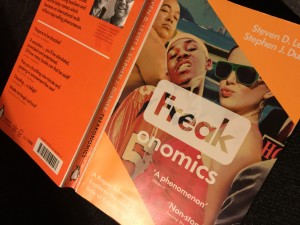 Freakonomics – A rogue economist explains the hidden side of everything, by Steven D. Levitt and Stephen J. Dubner. I like this book. It’s fun, provocative, asks some super-odd questions that I’d never have come up with myself, and generally makes my mind bend in new and intriguing ways. Levitt (the economist in the pair, Dubner is the writer) certainly has made some significant inroads to what he himself sees as a shortage in the field of economics: As Levitt sees it, economics is a science with excellent tools for gaining answers but a serious shortage of interesting questions.
Freakonomics – A rogue economist explains the hidden side of everything, by Steven D. Levitt and Stephen J. Dubner. I like this book. It’s fun, provocative, asks some super-odd questions that I’d never have come up with myself, and generally makes my mind bend in new and intriguing ways. Levitt (the economist in the pair, Dubner is the writer) certainly has made some significant inroads to what he himself sees as a shortage in the field of economics: As Levitt sees it, economics is a science with excellent tools for gaining answers but a serious shortage of interesting questions.
While crunching data to get at the answer to the query of what schoolteachers and sumo wrestlers have in common, data from Chicago was used, resulting in this mind boggling statement: An analysis of the entire Chicago data reveals evidence of teacher cheating in more than two hundred classrooms per year, roughly 5 percent of the total. This is followed up with an in-depth account of ways teachers cheat (in standardized testing), and how the data set available can show this. Quite amazing, I must say. Fortunately, the algorithms used to crunch the data also revealed the best teachers in Chicago. The analysis was used, the worst of the cheating teachers were sacked, and the best teachers were rewarded.
Another thing Steven and Stephen make very clear, is the difference between correlation and causality, the former being a statistical term that indicate whether two variables move together or not, whereas causality proves cause (x can cause y; y can cause x; or some other factor is causing both x and y). The chapter on What makes a perfect parent give ample evidence to how conventional wisdom is not necessarily true. For instance, everyone knows that parents should read to their kids, right? The more, the better. Well. No. It actually doesn’t matter that much, as there is no direct causality between reading to one’s kid every day and his/her school grades and success further on in adulthood.
Huh! Who would have known? Not me, that’s fore sure. I have most definitely bought into the conventional wisdom (is the modern name for it alternative fact?!) that parents must read aloud to kids, and since I’ve always been really bad at that, there’s been this little nagging thought, that I should have read more, I must be such a bad mother, have I condemned my kids to eternal failure…
An enjoyable read, humorous, odd-ball, giving me insights into things I’ve simply never ever considered before, I mean, these are the questions (and hence, chapters) of the book:
What do schoolteachers and sumo wrestlers have in common?
How is the Ku Klux Klan like a group of real-estate agents?
Why do drug dealers still live with their moms?
Where have all the criminals gone?
What makes a perfect parent?
Perfect parenting, part II; or:Would a Roshanda by any other name smell as sweet?
So yes, quite possibly the result of me reading this book will be just what Steven and Stephen hope for: The most likely result of having read this book is a simple one: you may find yourself asking a lot of questions. Many of them will lead to nothing. But some will produce answers that are interesting, even surprising.
The book I am blogging about is part of the book-reading challenge I’ve set for myself during 2018, to read and blog about 26 Swedish and 26 English books, one book every week, books that I already own.